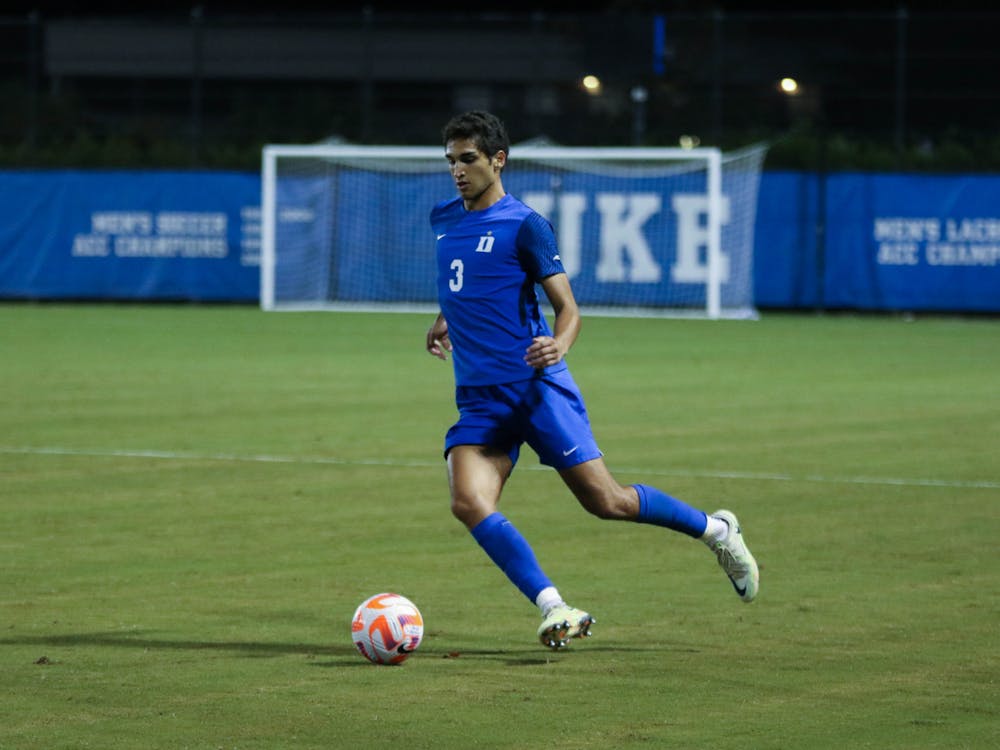Windsor. Eldridge. Bow. Bolo. There are many ways to tie a tie, something that the Blue Devils learned well in 2020-21. That season, the group went 4-10-3, while three of those losses and their home-opening win were decided in overtime, all of which would now be counted as ties with overtime no longer a part of the college game. Safe to say, a lot of minutes were spent in deadlock, with Duke pushing against an impenetrable barrier while presenting its own.
The 2020-21 season was the first campaign for much of this year’s core. Midfielders Peter Stroud and Nick Pariano and defenders Lewis McGarvey, Amir Daley and Antino Lopez, now juniors, were freshmen then. Meanwhile, graduate goaltender Eliot Hamill saw his first-ever game action and start in the spring portion of that season. Of the two seniors who regularly see the field in 2022—midfielder Cameron Kerr and forward Scotty Taylor—only the latter hit the field before 2020.
So, when the clock wound down to zero at Koskinen Stadium in the Blue Devils’ Friday date with North Carolina and the scoreboard read an even 1-1, that core was in familiar territory.
“We were on top most of the game, and felt good about our play, and just maybe not as sharp in the final third as we like to be and normally are,” head coach John Kerr said afterward. “I thought we played really well overall. ... That's just how it goes sometimes.”
Two seasons ago, it was apparent early on that the Blue Devils had an immense amount of talent at their disposal, but they just could not convert. Through 17 games, they only scored 19 goals, and almost every postgame interview that year featured some variation of Kerr lamenting struggles in the “final third,” a mantra that had not been heard in a while before Friday.
Still, one thing a season like that one will teach is resiliency. That lesson fell to the wayside during the blitzkrieg that was the 2021 season. Finishing 14-5-1, scoring 43 goals in the process and making a trip to the ACC championship will do that. But in Friday’s gritty all-or-nothing battle, the Blue Devils got a reminder and proved that they were still up to the task.
The game’s only goals came within three seconds of each other, just preempting the 11-minute mark. Beginning with a backheel pass from Pariano to sophomore midfielder Ruben Mesalles, and ending with Daley sliding to tap in a cross from Mesalles, Duke’s goal was one of those plays in which everything goes right. And it was completely overshadowed by North Carolina's Akeim Clarke and Hilli Goldhar connecting to beat the Duke back line and Hamill right off the kickoff.
“We’re kind of kicking ourselves now because that's just tough,” Stroud said. “It's a tough feeling when you get a goal and you're so high on adrenaline, and then they run down the field and do that. It can be pretty deflating.”
For the rest of the game, the Blue Devils and Tar Heels fought for possession and dangerous scoring chances in between bouts of fouls, yellow cards and injuries. Twenty-nine total fouls were doled out—17 to North Carolina, 12 to Duke—and each team received two on-field yellow cards, in addition to one handed to Duke’s bench. Mesalles, just ten minutes after assisting on Duke’s only goal, left the game due to a rolled ankle and was replaced by junior Luke Thomas. Sophomore forward Shakur Mohammed also went down hard but got back up and walked it off, and the team as a whole took the physicality in stride.
“In tough situations, when… the other team’s on top of us a bit, it can draw a breath for everyone, going down,” Stroud said of how they handled it. “Stay on the floor for a second. Let the team regroup for a bit. … But I try and stay on my feet as much as possible.”
The Blue Devils dealt their fair share of hard tackles as well. As North Carolina bared down on them—especially the back line—in a desperate attempt to get an edge, they didn’t waver. Considering the tumultuousness of Duke’s defensive lineup, this was especially impressive.
With McGarvey recovering from surgery, the Blue Devils have adjusted their scheme to a three-back lineup, rather than the four-back of the previous two seasons. But then freshman defender Axel Gudbjornsson got a red card against Michigan and was unavailable against Louisville. He returned Friday, but Mesalles, a big defensive contributor, left early, forcing the back line to fill his gap.
However, the back line has more than just adapted. Using three defenders makes sense from a limited personnel standpoint, but it also gave Duke the opportunity to use Daley at wingback. Quick and agile, Daley can excel when given the flexibility to contribute on offense, and against North Carolina, the move paid off with a goal. Meanwhile, Gudbjornsson and fellow freshman Kamran Acito bracketed Lopez at center back, and the trio was nearly unbeatable, especially when North Carolina descended near their goal.
“I feel that those two guys are getting better with each game,” Kerr said of the freshman duo. “They’re only four or five games in now, and they're playing like veteran players.”
Offensively, the Tar Heels were barraged by Duke. The Blue Devils had 10 shots and 10 corner kicks to North Carolina’s four of each, and by the eye test alone, Duke was in control. But that doesn’t matter when the game ends in a tie. As fans filed out and dueling cheers of “Go Duke!” and “Go Heels!” faded into whispers, the what-could-have-been is just a reminder of what is.
Still, it’s difficult to walk away from that game disappointed in how the Blue Devils played. As frustrating as tying an archrival must be, the score, so reminiscent of a harder time in the team’s history, is a reminder of how much the team has grown since.
In the second overtime of the 2020 home-opener, then-freshman Pariano tapped in the game’s only goal in the last possible minute off an assist from Stroud. The two are now some of the sharpest arrows in Duke’s quiver, but then they were rough-around-the-edges rookies who capitalized on a chance—a rare occasion that year.
It’s not a rare occasion anymore, and walking away Friday with a tie is a reminder of how many times the Blue Devils have capitalized on their chances since the team’s leaders first took to the field.
“We're going to do better, and we're going to get sharper in the box, and we're going to keep working on finishing, and hopefully in the next game we're gonna win,” Kerr said.
Two years ago, it would have been hard to sincerely believe that Duke would rebound from an outcome like this. In 2022, it’s not just believable, it feels inevitable.
Get The Chronicle straight to your inbox
Sign up for our weekly newsletter. Cancel at any time.

Sasha Richie is a Trinity senior and a sports managing editor of The Chronicle's 118th volume.

